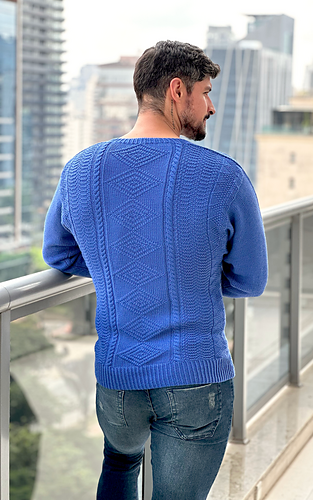patterns >  Felipe Cavalheiro's Ravelry Store
Felipe Cavalheiro's Ravelry Store
> Visser







Visser
About it:
Visser is a drop-shoulder sweater with an I-cord-edged saddle shoulder that pays homage to the heritage of ganseys from the other side of the English Channel, specifically from Holland. “Visser” means “fisherman” in Dutch, and this design brings together various traditional patterns collected from fisherman villages across the country.
This pattern includes a comprehensive description of the I-cord Edged Saddle Shoulder technique, as developed by Joyce Williams, which ensures a professional finish that is sure to impress. Additionally, instructions for shaping underarm gussets are provided to guarantee a comfortable and flattering fit for all body types.
Indicated Gauge:
24 sts & 34 rnds = 4” / 10 cm measured over plain stockinette stitch knitted in the round with US size 4 / 3.5 mm needles, after blocking.
18 sts & 36 rnds = 4” / 10 cm measured over front motifs knitted in the round with US size 4 / 3.5 mm needles, after blocking.
18 sts & 33 rnds = 4” / 10 cm measured over back motifs knitted in the round with US size 4 / 3.5 mm needles, after blocking.
26 sts & 35 rnds = 4” / 10 cm measured over saddle shoulder / top sleeve motif knitted flat (forward and reverse rows) with US size 4 / 3.5 mm needles, after blocking.
22 sts & 36 rnds = 4” / 10 cm measured over k1tbl x p1 ribbing pattern knitted in the round with US size 4 / 3.5 mm needles, after blocking.
Sizes:
Visser is size-inclusive, with grading available for 13 different sizes, ensuring that all knitters can create a perfect fit for their intended wearer. The available sizes are: 1 (2, 3, 4, 5) (6, 7, 8, 9) (10, 11, 12, 13), corresponding to chest circumferences of 33¼ (36½, 39½, 42¾, 49) (52, 55, 58¼, 61¼) (67½, 70¾, 73¾, 80)” 83½ (91, 99, 106½, 122) (130, 138, 145½, 153½) (169, 176½, 184½, 200) cm. The sample modeled by Felipe is size 49” / 122 cm with 1¾” / 4 cm of positive ease and was flawlessly knit by Cida D. Vitullo.
Yarn/Yardage:
The sample was knitted with organic non-superwash Italian merino yarn, selected for its superior quality, and in the traditional air-force blue color for ganseys. This yarn provides the perfect texture and stitch definition required to showcase the intricate gansey patterns featured in this design. Estimated yardage for all sizes: 1 (1259 yds / 11 balls); 2 (1353 yds / 12 balls); 3 (1455 yds / 13 balls); 4 (1568 yds / 14 balls); 5 (1699 yds / 15 balls); 6 (1835 yds / 16 balls); 7 (1929 yds / 17 balls); 8 (2066 yds / 18 balls); 9 (2164 yds / 19 balls); 10 (2381 yds / 20 balls); 11 (2499 yds / 21 balls); 12 (2646 yds / 23 balls); 13 (2837 yds / 24 balls).
Notions:
Stitch markers or coilless safety pins (in different colors to differentiate the beginning of the round from the patterns edges); waste yarn (to hold sts temporarily, as well as for provisional CO); blunt tapestry needle (for Kitchener Stitch/Grafting); sharp tapestry needle (for weaving in ends); necessary tools for your preferred method of securing steek before cutting; and blocking tools.
Required Techniques:
Long-tail CO; provisional CO of knitter’s choice; E-loop CO for steek sts; dec (k2tog, ssk, p2tog, and p3tog ) and inc techniques (p1fbf and any other inc method of knitter’s choice to establish the total number of stitches for the body circumference); reading knitting charts; knitting in the rnd; k and p sts; k1tbl; knitting k and p sts in the back-backwards mode (optional); knitting up stitches; Joyce William’s I-cord Edged Saddle Shoulders (technique thouroughly described in the Special Techniques Section); setting, securing, cutting, and finishing a steek; regular bind off; Elizabeth Zimmermann’s (EZ) sewn cast-off method, weaving in ends inside a hand-knitted fabric; and blocking.
The knitting pattern offers clear and concise instructions that are easy to follow, providing an excellent opportunity for knitters of all skill levels to refine their skills and create an exceptional garment.
166 projects
stashed
121 times
- First published: June 2023
- Page created: June 23, 2023
- Last updated: June 24, 2023 …
- visits in the last 24 hours
- visitors right now




